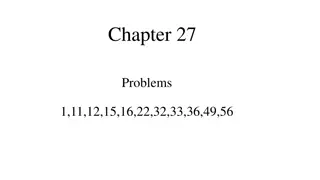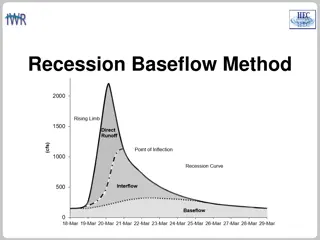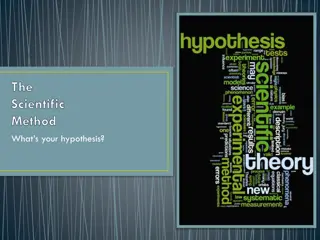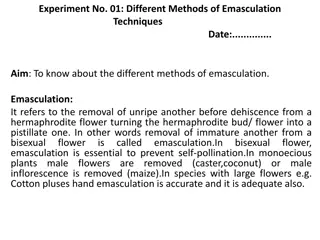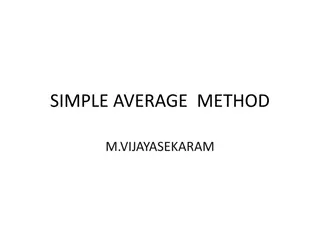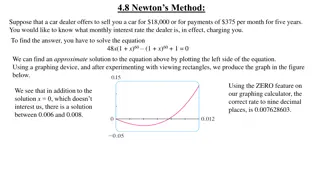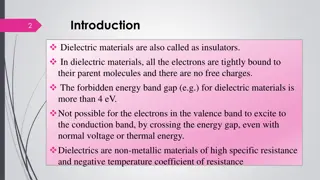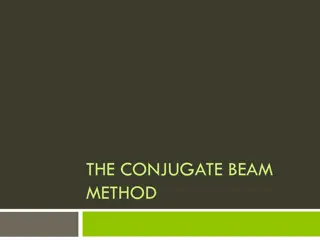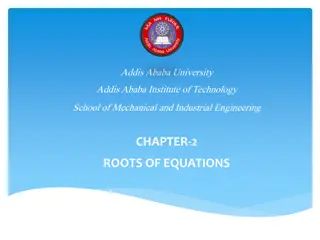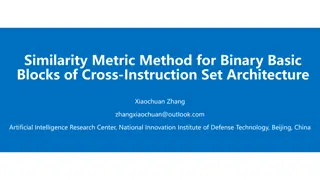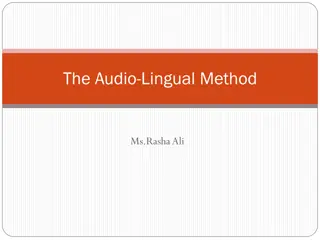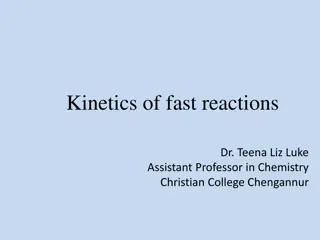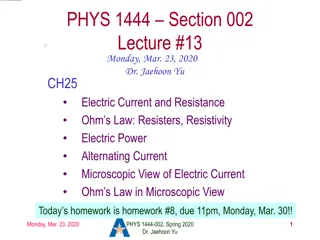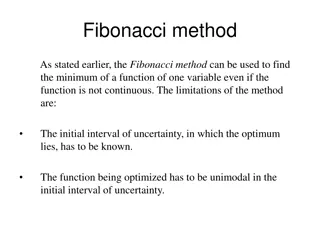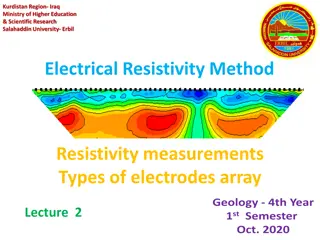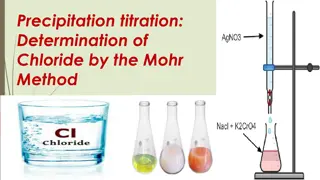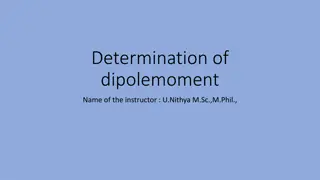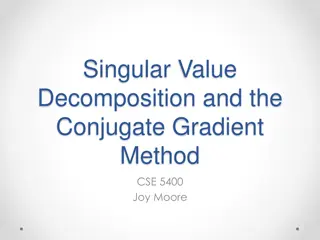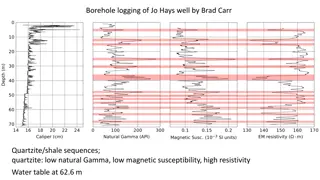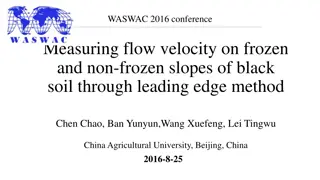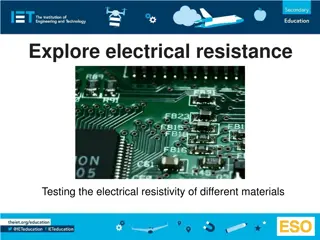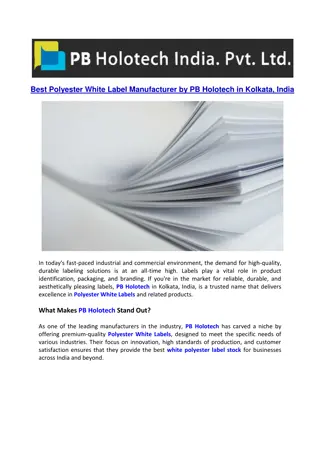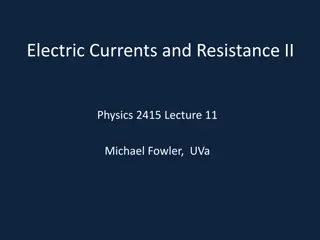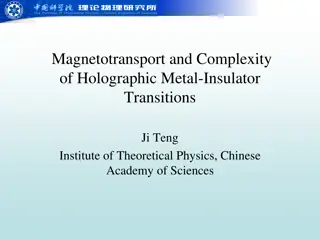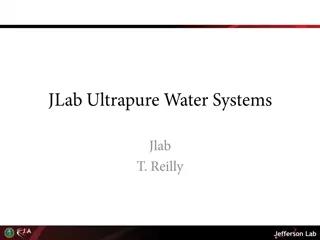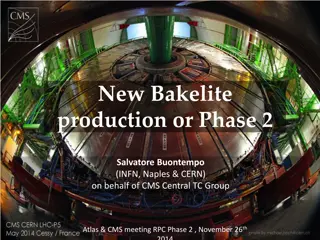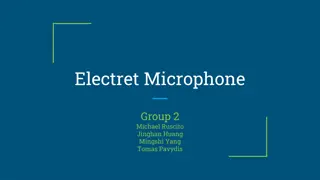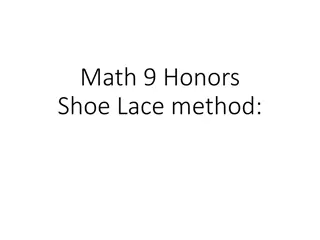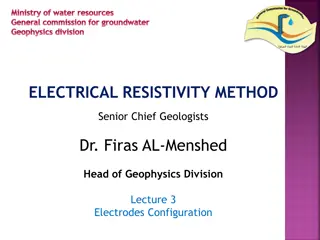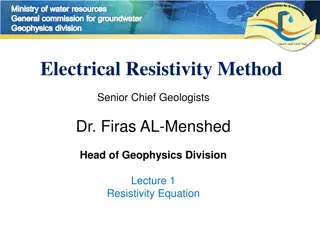Language Teaching Techniques: GTM, Direct Method & Audio-Lingual Method
Explore the Grammar-Translation Method, Direct Method, and Audio-Lingual Method in language teaching. Understand principles, objectives, and methodologies with insights into language learning approaches. Enhance teaching skills and foster effective communication in language education.
3 views • 82 slides
Electromagnetic Surveying Methods and Applications
Electromagnetic surveying, conducted by Dr. Laurent Marescot, utilizes various methods like resistivity, induced polarization, and high-frequency techniques for exploration and investigation purposes. The electromagnetic method involves generating primary fields and detecting secondary fields to ana
2 views • 55 slides
Physics Chapter 27 Practice Problems
The chapter 27 problems involve concepts related to current, drift speed of electrons, current density, resistance, resistivity, temperature effects on resistance, and power calculations. The problems cover scenarios such as cathode ray tubes, aluminum wires, gold wires, tungsten wires, conductor re
0 views • 12 slides
Understanding the Recession Baseflow Method in Hydrology
Recession Baseflow Method is a technique used in hydrology to model hydrographs' recession curve. This method involves parameters like Initial Discharge, Recession Constant, and Threshold for baseflow. By analyzing different recession constants and threshold types such as Ratio to Peak, one can effe
0 views • 8 slides
Understanding the Scientific Method: A Logical Framework for Problem-Solving
The Scientific Method is a systematic approach used to solve problems and seek answers in a logical step-by-step manner. By following key steps such as stating the problem, researching, forming a hypothesis, testing, analyzing data, and drawing conclusions, this method helps clarify uncertainties an
0 views • 18 slides
Introduction to Six Thinking Hats Method for Effective Group Decision Making
Explore the Six Thinking Hats method, a powerful tool for facilitating group discussions and decision-making processes. This method encourages participants to approach problems from various perspectives represented by different colored 'hats'. By simplifying thinking and fostering constructive dialo
1 views • 24 slides
Understanding Corn Growth Stages: Leaf Staging Methods and Considerations
Various leaf staging methods, including the Leaf Collar Method and Droopy Leaf Method, are used to identify corn plant growth stages. The Leaf Collar Method involves counting leaves with visible collars, while the Droopy Leaf Method considers leaves at least 40-50% exposed from the whorl. Factors li
0 views • 9 slides
Understanding Different Emasculation Techniques in Plant Breeding
Learn about the significance of emasculation in plant breeding to prevent self-pollination and facilitate controlled pollination. Explore various methods such as hand emasculation, forced open method, clipping method, emasculation with hot/cold water, alcohol, suction method, chemical emasculation,
2 views • 10 slides
Simple Average Method in Cost Accounting
Simple Average Method, introduced by M. Vijayasekaram, is a technique used for inventory valuation and delivery cost calculation. It involves calculating the average unit cost by multiplying the total unit costs with the number of receiving instances. This method simplifies calculations and reduces
2 views • 5 slides
Understanding Newton's Method for Solving Equations
Newton's Method, also known as the Newton-Raphson method, is a powerful tool for approximating roots of equations. By iteratively improving initial guesses using tangent lines, this method converges towards accurate solutions. This method plays a crucial role in modern calculators and computers for
0 views • 12 slides
Understanding Dielectrics and Insulators in Electrical Engineering
Dielectric materials, also known as insulators, have tightly bound electrons with no free charges, characterized by a forbidden energy band gap of over 4 eV. Insulators, on the other hand, prevent electric current flow due to high resistivity and strong covalent bonds. Learn about the differences, d
1 views • 22 slides
Understanding the Conjugate Beam Method in Structural Analysis
The Conjugate Beam Method is a powerful technique in structural engineering, derived from moment-area theorems and statical procedures. By applying an equivalent load magnitude to the beam, the method allows for the analysis of deflections and rotations in a more straightforward manner. This article
0 views • 11 slides
Understanding Roots of Equations in Engineering: Methods and Techniques
Roots of equations are values of x where f(x) = 0. This chapter explores various techniques to find roots, such as graphical methods, bisection method, false position method, fixed-point iteration, Newton-Raphson method, and secant method. Graphical techniques provide rough estimates, while numerica
0 views • 13 slides
Binary Basic Block Similarity Metric Method in Cross-Instruction Set Architecture
The similarity metric method for binary basic blocks is crucial in various applications like malware classification, vulnerability detection, and authorship analysis. This method involves two steps: sub-ldr operations and similarity score calculation. Different methods, both manual and automatic, ha
0 views • 20 slides
Exploring the Audio-Lingual Method in Language Teaching
The Audio-Lingual Method is an oral-based approach that focuses on drilling students in grammatical sentence patterns through behavioral psychology principles. This method, also known as the Michigan Method, emphasizes habit formation and uses techniques like dialogues, repetition drills, and role-p
1 views • 16 slides
Understanding the Kinetics of Fast Reactions in Chemistry
Kinetic methods involve measuring analytical signals under dynamic conditions to study fast reactions in chemistry. This study explores the various methods used, such as Flow Method and Stopped Flow Method, to determine reaction rates accurately. Advantages of the Stopped Flow Method over Continuous
0 views • 18 slides
Electric Current and Resistance: Lecture Highlights and Mid-term Exam Reminder
Today's lecture covers topics on electric current, resistance, Ohm's Law, resistors, resistivity, electric power, and microscopic views of current flow. Important announcements include reading assignments, mid-term exam details, online class rules, and exam guidelines. A refresher on electric curren
0 views • 19 slides
Understanding the Fibonacci Method for Function Optimization
The Fibonacci method offers a systematic approach to finding the minimum of a function even if it's not continuous. By utilizing a sequence of Fibonacci numbers, this method helps in narrowing down the interval of uncertainty to determine the optimal solution through a series of experiments. Despite
1 views • 19 slides
Understanding Resistivity Measurements in Geology
Explore the concept of resistivity measurements in geology, focusing on electrode configurations such as Wenner and Schlumberger arrays. Learn about the potential differences in electrode setups and how to calculate apparent resistivity through geometrical factors. Various electrode arrangements and
0 views • 22 slides
Understanding Electrical Conductors and Insulators
Electrical conductors like metals allow the flow of charge, while insulators like wood and plastic impede the flow. Copper, silver, and aluminum are examples of good conductors, with high conductivity. Insulators have high resistivity, preventing the easy flow of electric current. Learn about the pr
3 views • 5 slides
Determination of Chloride by Mohr Method
Precipitation titration is a volumetric method used for determining chloride ions. Mohr's method involves reacting alkaline or alkaline earth chlorides with silver nitrate in the presence of a potassium chromate indicator. The endpoint of the titration is signaled by the appearance of red silver chr
0 views • 9 slides
Determination of Dipole Moment in Chemistry
The determination of dipole moment in chemistry involves methods such as the Temperature Method (Vapour Density Method) and Refractivity Method. These methods rely on measuring various parameters like dielectric constants and polarizations at different temperatures to calculate the dipole moment of
1 views • 15 slides
Pixel Array Status and Drawing Rules for High-Resistivity Epi Design
This collection of images and descriptions provides an overview of the pixel array status as of April 26, 2019, along with drawing rules for high-resistivity epi design. The pixel array features various components such as Pixel_S1, Pixel_S3, and the overall array structure. Drawing rules highlight t
4 views • 9 slides
Accounting Entries in Hire Purchase System for Credit Purchase with Interest Method
In the Credit Purchase with Interest Method of Hire Purchase System, assets acquired on hire purchase basis are treated as acquired on outright credit basis with interest. This method involves initial entries for recording the asset acquisition, down payments, interest on outstanding balance, instal
0 views • 10 slides
Understanding Singular Value Decomposition and the Conjugate Gradient Method
Singular Value Decomposition (SVD) is a powerful method that decomposes a matrix into orthogonal matrices and diagonal matrices. It helps in understanding the range, rank, nullity, and goal of matrix transformations. The method involves decomposing a matrix into basis vectors that span its range, id
0 views • 21 slides
Understanding Scatter Diagram Method for Correlation Analysis
Scatter Diagram Method is a simple and effective way to study the correlation between two variables. By plotting data points on a graph, it helps determine the degree of correlation between the variables. Perfect positive and negative correlations, as well as high and low degrees of correlation, can
0 views • 11 slides
Borehole Logging of Jo Hays Well by Brad Carr - Geological Analysis
Explore the borehole logging results of Jo Hays Well conducted by Brad Carr, revealing quartzite/shale sequences with specific characteristics like low natural gamma, low magnetic susceptibility, and high resistivity. The water table is identified at 62.6 meters depth, offering insights into the geo
0 views • 4 slides
Measurement of Flow Velocity on Frozen and Non-Frozen Slopes of Black Soil Using Leading Edge Method
This study presented a detailed methodology for measuring flow velocity on frozen and non-frozen slopes of black soil, focusing on the Leading Edge method. The significance of shallow water flow velocity in soil erosion processes was emphasized. Various methods for measuring flow velocity were compa
0 views • 23 slides
Understanding Electrical Resistance Testing
Explore the world of electrical resistance testing by learning how to measure resistivity, using a multimeter, and understanding the basics of resistance. Stay safe by following proper procedures and equipment guidelines throughout the testing process.
0 views • 16 slides
Best Polyester White Label Manufacturer by PB Holotech in Kolkata, India
Our organization is engaged in offering quality approved Polyester White. This is a white opaque polyester, which is known for its great tear strength and high resistivity. Moreover, it has a permanent hot melt rubber adhesive with very high initial
0 views • 4 slides
Understanding Electric Currents and Resistance II in Physics
Capacitors, resistance, energy usage, and the microscopic picture of conductivity are explored in this lecture on electric currents and resistance II in Physics 2415. Discover the relationship between voltage, charge, current, and resistance, along with insights into power usage, resistivity, and th
0 views • 22 slides
Well Re-Completion and Evaluation Summary for AKAKOCA-1 Platform: Overview of Operations and Pay Intervals
This detailed summary covers the re-completion, log evaluation, and perforation carried out on the AKAKOCA-1 platform on 26th October 2023. It includes information on the well location, trajectory, gas pay intervals, sand intervals (C, B, A, and AA), along with gas percentages, resistivity, and flui
0 views • 15 slides
Complexity of Holographic Metal-Insulator Transitions in Magnetotransport
The mechanism of metal-insulator transition is a fundamental yet complex problem in condensed matter physics. Various theories attempt to explain this transition, such as critical points, disorder-driven transitions, and interaction-localization approaches. A holographic model reveals key insights i
0 views • 16 slides
Water Quality Analysis Results and Instrument Specifications
Water quality analysis results including resistivity, TOC levels, particle counts, and instrument specifications for a water purification system. The analysis shows values for resistivity, TOC levels, particle size distribution, temperature, pressure, flow rates, and more. Various instruments from M
0 views • 9 slides
New Bakelite Production Phase 2: Salvatore Buontempo Presentation at CMS Central TC Group Meeting
Salvatore Buontempo presented on behalf of CMS Central TC Group at a meeting discussing Bakelite production facilities in Puricelli for CMS RE4 production. The presentation covered new production constraints, quality control measures, and details of the production facilities including a large craft
0 views • 11 slides
Understanding Electret Microphones: Components, Mechanism, and Types
Electret microphones are a type of electrostatic capacitor-based microphone that eliminates the need for a polarizing power supply. They contain a permanently charged material known as an electret, which allows them to function without external power. This type of microphone has a built-in charge th
0 views • 8 slides
Advancements in RWELL Tracking Detectors for Particle Detection
Conducted by Daojin Hong on behalf of USTC MPG Group, this R&D focuses on RWELL detectors, a promising technology for the SoLID tracker detector. Motivated by GEM requirements, the RWELL detector offers advantages like simplicity, compactness, low mass, and discharge suppression. The use of Diamond-
0 views • 17 slides
Understanding the Shoe Lace Method for Finding Polygon Areas
The Shoe Lace Method is a mathematical process used to determine the area of any polygon by employing coordinate geometry. By following specific steps, including organizing coordinates, multiplying diagonally, and adding columns in a certain manner, the method allows for a straightforward calculatio
0 views • 8 slides
Geophysical Methods for Groundwater Exploration: Electrodes Configuration and Array Types
The lecture discusses the utilization of electrical resistivity methods in geologic investigations, focusing on electrode configurations such as symmetrical linear and non-linear arrays. Detailed insights are provided on the Wenner and Schlumberger arrays, including their properties and depth of inv
0 views • 12 slides
Understanding DC Resistivity Method in Geophysics
The DC resistivity method is widely used in geophysics for measuring earth resistivity, especially in groundwater exploration and various other studies. This method involves passing an electric current through the ground and measuring the resulting potential difference to determine the earth's resis
0 views • 15 slides


